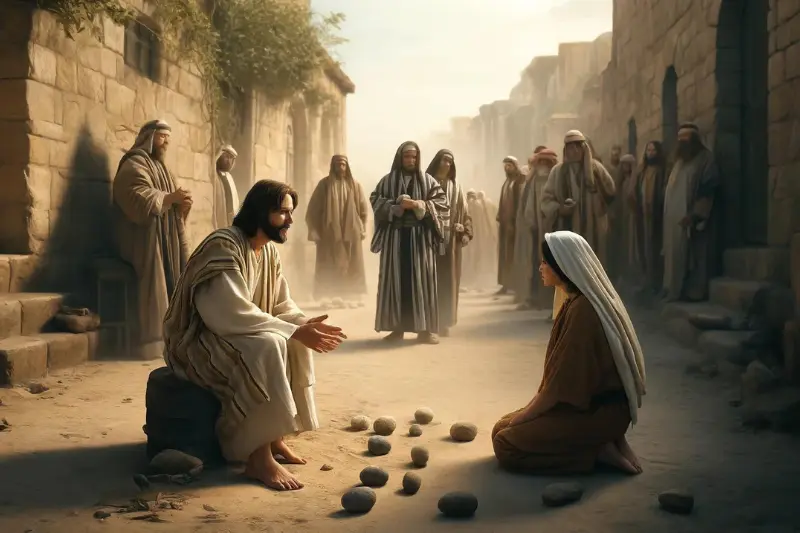Neither do I Condemn Thee
She said, No man, Lord. And Jesus said unto her, Neither do I condemn thee: go, and sin no more. (John 8:11, KJV)

If nothing about what the Bible teaches on grace has made you uncomfortable, this might: Jesus says, “neither do I condemn you.” Paul echoes with “no condemnation” in Romans 8:1. Let’s explore this story of a woman caught in adultery to uncover the depths of grace and the craftiness of sinful nature.
One beautiful day in Jerusalem, a strange event occurred. A man and a woman were caught in adultery. The woman was brought to Jesus from the bed of adultery, but the scripture is silent on the man’s whereabouts.
According to the Law (Leviticus 20:10), those caught in adultery were to be killed. Thus, the woman should have been stoned. But what would Jesus say? Would He, as the compassionate Teacher, publicly defy God’s Law? Beneath this was a profound battle of Law vs. grace. The religious leaders were about to encounter the depth of God’s wisdom and grace.
When asked for His opinion, Jesus responded, “He that is without sin among you, let him first cast a stone at her” (John 8:7, KJV). Which of these seemingly “righteous and holy” religious leaders would dare throw the first stone, publicly declaring they had no sin? Scripture shows they left, starting with the eldest. These leaders were ready to execute a woman for exposed sin, while deserving the same punishment for their own hidden sins, known also to God. Sinful nature is quick to judge and condemn others.
Jesus told the woman, “neither do I condemn you,” meaning He would not make her suffer the full punishment of her sins—death under the Law. This message extends to us today. What did she do after leaving Jesus? Scripture is silent, but we can imagine. Do you think she returned home, relieved to escape death, only to continue in her next adventure of adultery with the next man in her life, assuming Jesus would forgive her again? I do not think so.
Hear this: the riches of grace, when received, do not produce sin. Instead, they inspire awe in our hearts for Jesus, a profound love for Him, and an eagerness to walk and please Him like never before.
Brethren, accept God’s grace as Scripture describes it. Here again are Jesus’s words to us, initially spoken to the woman:
And Jesus said unto her, Neither do I condemn thee: go, and sin no more.” (John 8:11, KJV)
Meditate
Did that woman deserve to die according to the Law? Is grace then against God’s Law? (Galatians 3:21).
Apply the Word
If you are burdened with shame, guilt, or self-condemnation, you are rejecting the grace Jesus brought. Remember, this is about what Jesus has done, not about us. Our role is to accept it. If God says there is no condemnation and we feel condemnation to satisfy our religious desires, we are rejecting His offer and despising His work. So, enjoy your Savior, receive life abundantly, and let it overflow. Our Savior is here!
Pray
What can we say to the Lord but thank you for such bountiful grace. So thank Him!
Recommended reading
- What Does “There Is No Condemnation” Mean?
- The Danger of Self-Condemnation
- Is Grace a License to Sin?
- Judge Not, and Ye shall not be Judged
- The Truth That Frightened the King James Translators
- The Slander of Grace
Free Mini E-book: From Spiritual Dryness to Flourishing






